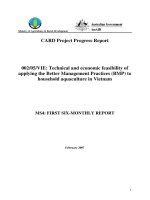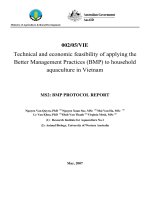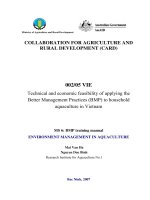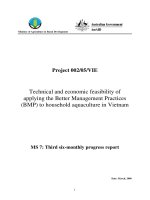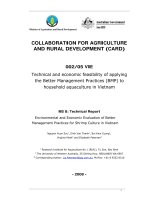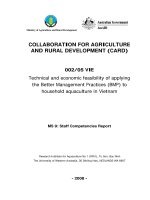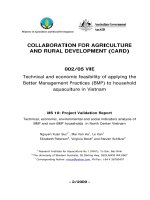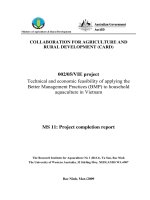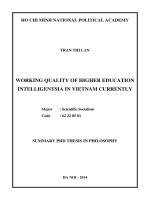Summary of dissertation for juris Doctor degree: Human rights education for in Vietnam
Bạn đang xem bản rút gọn của tài liệu. Xem và tải ngay bản đầy đủ của tài liệu tại đây (286.33 KB, 31 trang )
VIETNAM ACADEMY OF SOCIAL SCIENCES
GRADUATE ACADEMY OF SOCIAL SCIENCES
K
NGO VAN NAM
HUMAN RIGHTS EDUCATION FOR HIGH
SCHOOL STUDENTS IN VIETNAM
NỘI ĐỊA Ở ĐỒNG B
ẰNG SÔNGG
Major: Constitutional Law and Administrative Law
Major code
: 9 38 01 02
SUMMARY OF DISSERTATION FOR JURIS
DOCTOR DEGREE
HANOI – 2018
The project was completed at:
GRADUATE ACADEMY OF SOCIAL SCIENCES
Supervisor: ASSOC. PROF. PHD. PHAM HUU NGHI
Reviewer 1: PROF. PHD. PHAM HONG THAI
Reviewer 2: ASSOC. PROF. PHD. TUONG DUY KIEN
Reviewer 3: ASSOC. PROF. PHD. LE THI HUONG
The dissertation will be defended against the Doctoral
Dissertation Review Board at Graduate Academy of Social
Sciences
At
hour
day
month year 2018
The dissertation is available on:
National Library
Library of Graduate Academy of Social Sciences
LIST OF POST-GRADUATES’ PUBLISHED SCIENTIFIC
PROJECTS IN RELATION TO THIS DISSERTATION
NO.
NAME OF PROJECT
FORM OF PUBLICATION
1
Fundamental principles of human rights
Journal of Democracy and Law
education for high school students in
In December (297), 2016
Vietnam
2
Roles of families in human rights
Journal of Democracy and Law
education for high school students in
Special issue in January, 2017
Vietnam at the present
PREAMBLE
1. Rationale of the project
Human rights education for high school students is especially
important in the society of law and integration. The purposes and
benefits of human rights education for high school students are to
build a sense of respect, observance of the law, understanding and
respect, use and protection of human rights, and the sense of
citizenship responsibility towards the community and society.
Since 1994, the United Nations has launched globally the
decade for human rights education. Human rights education contains
a broad connotation, which is an integral part of legal education. The
two most important functions of human rights education are
provision of basic knowledge, building a sense of respect, protection
and using the human rights of each person and of others.
Human rights education for high school students is particularly
important in the context of the implementation of the Resolution of the
8th Congress of the 11th Party Central Committee (Resolution No. 29NQ/TW) on fundamental and comprehensive innovation in education.
In fact, the children’s rights, education and practice of human
rights are currently limited. There are many situations in which
students’ rights and interests are infringed in daily life. Students
themselves have not been aware of necessary knowledge about their
rights and protective measures.
Currently, as human rights education for high school students
is just the beginning step, the organization and contents, forms and
1
methods are still limited. On the theoretical basis, thorough and
comprehensive studies on human rights education for high school
students in our country today should be conducted.
For all the foregoing reasons, the PhD candidate has selected
“Human rights education for high school students in Vietnam” project
for the doctoral dissertation.
2. Research objectives and tasks of the dissertation
2.1. Research objectives
This dissertation aims to comprehensively and systematically
study the fundamental theories of human rights education for high
school students. From the known theoretical foundations, the
dissertation will assess the current situation and propose innovation to
improve the effectiveness of human rights education for high school
Vietnamese students based on practical requirements.
2.2. Research tasks
In order to achieve the aforementioned objectives, the
dissertation focuses on the following specific tasks:
The first task is to study the fundamental theoretical issues of
human rights education for high school students, the fundamental
characteristics in terms of contents, forms, methods, factors affecting
the human rights education activities for high school students.
The second task is research, analysis and evaluation of the
current status of human rights education for high school students. The
author investigates human rights education for high school students in
2
some localities to prove the scientific arguments set out in the
dissertation.
The third task is to study and propose solutions to enhance
the effectiveness of human rights education for high school students
based on the experiences of some countries which may be applied in
current conditions in Vietnam.
3. Scope and subjects of the project
3.1. Scope of study
- Scope of contents:
The scope of study covers the fundamental theoretical issues
on human rights education for high school students, including basic
elements: object, subject, contents, form, factors of influence and
conditions for implementation assurance; study of the status quo;
proposal of perspectives and solutions for renovation and efficiency
improvement of human rights education for school students.
- Population and objects of study
The dissertation focuses on research and survey in some high
schools in Hanoi, Thua Thien Hue and Ho Chi Minh City. The selection
of survey sites was allocated to three geographic areas (Northern,
Central and Southern regions).
Objects in the survey on current situation of human rights
education comprise high school managers, teachers of Ethics and
Civic Education, Legal Education and high school students.
- Scope of time:
3
The dissertation focuses on studying and examining the
human rights education for high school students in recent years, from
2013 up to the present.
3.2. Subject of study
Subject of study is current human rights education for high
school students in our country. The concept of high school students is
construed under the Education Law 2005 (amendment in 2009)
consisting of elementary, secondary and high school students.
4. Research methodology and methods of the dissertation
In terms of methodology, the dissertation is conducted based
on Marxist-Leninist principles and Ho Chi Minh’s ideology on the
State, law and human development; Party’s principles and guidelines
on the protection of human rights; modern political-legal science on
human rights, human rights education.
- In terms of research methods:
To perform the tasks of the dissertation, the author uses specific
methods such as analysis, synthesis, deduction, induction, historical,
comparison, sociological investigation of all research issues of the
dissertation.
- Document analysis method is used to study materials in
scientific
projects,
monographs,
scientific
articles,
journals
containing analysis and findings made by other authors; Party’s
documents, legal documents of the State, published official statistics.
This method is mainly used in Chapter 1, Chapter 2 of the
Dissertation.
4
- Systematic and cross-disciplinary method is used to clarify
that the subject of research has a close relationship with various
social sciences such as pedagogy, psychology, sociology, etc. This
method is mainly applied in Chapter 2 and Chapter 3 of the
Dissertation.
- Sociological investigation method is used in researching,
investigating and evaluating the current status of awareness and
implementation of human rights education for high school students.
The contents of the sociological investigation were mainly obtained
from some high schools in Hanoi, Thua Thien Hue and Ho Chi Minh
City.
5. New contributions of the Dissertation
- The dissertation studies and clarifies the fundamental features
of human rights education for high school students in the orientation
of equipping them with practical knowledge and skills in line with
the policy on substantial and comprehensive renovation in education
and training.
- It studies whether the factors affect human rights education
for high school students in positive or negative direction;
- Research, survey and assessment of the current status of
human rights education are conducted in some schools in order to
clarify the shortcomings and limitations in current human rights
education for high school students in Vietnam.
5
- The Dissertation proposes ideas and solutions to renovate and
improve the effectiveness of human rights education for high school
students in the current conditions of Vietnam.
6. The scientific and practical significance of the
dissertation
6.1. Regarding scientific significance
The findings of the dissertation contribute to supplementation
and development of fundamental theoretical issues on human rights
education for high school students. The dissertation can be used as a
document for teaching, studying and scientific research in the field of
human rights and human rights education.
6.2. Regarding practical significance
The dissertation is a reference source for the development of
legal documents on human rights education, programs and guidelines
for the implementation of human rights education for high school
students. The dissertation is a good reference source for research,
teaching, studying in terms of law, human rights education in the
pedagogical curriculum and extracurricular programs
7. Structure of the Dissertation
In addition to the preamble, conclusion, references, the
Dissertation consists of four chapters as follows:
Chapter 1. Literature review
Chapter 2. Theoretical issues on human rights education for
high school students.
6
Chapter 3. Current status of human rights education for high
school students in Vietnam.
Chapter 4. Perspectives and solutions for renovating and
improving the effectiveness of human rights education for high
school students in Vietnam at the present.
7
Chapter 1
LITERATURE REVIEW
1.1. Overview of research in the country
Through studying scientific works in relation to the project, the
author classifies as follows:
1.1.1. Scientific works on policies for respecting, protecting
and
guaranteeing
human
rights
and
requirements
on
institutionalization of human rights in the national legal system
Main content of this group of scientific works is to affirm
Vietnam’s consistent policy of protecting and guaranteeing human
rights and awareness of the importance of human rights education for
all subjects including high school students.
1.1.2. Scientific works on human rights education
The researches deal with the elements of human rights
education, including the contents, methods, subjects of education,
objects of human rights education, forms of human rights education.
This research was designed to support the development of human
rights education for high school students.
1.1.3. Research on human rights education for high school
students
The main content of this scientific work group focuses on
human rights education for high school students which is developed
and implemented in line with the psychological characteristics and
learning environment of high school students; identifying methods,
8
approaches and contents of human rights education in line with the
characteristics of high school-aged students.
1.2. Overview of research on human rights education for
high school students in foreign countries
In foreign countries, the researches on human rights education
in general and human rights education for high school students in
particular have been taken into consideration by many researchers in
various aspects.
1.3. Overview of research situation
1.3.1. Research findings produced and inherited in the
process of carrying out the Dissertation
The prominent common feature of the researches is affirmation
of the extreme importance of human rights education for high school
students. Human rights education is both universal and specific,
depending on the specific conditions of each nation.
Human rights education is aimed at building capacity, practical
skills and the protection of human rights for individuals themselves
and for others. At the same time, it defines the diversity of contents,
forms, methods and approaches of human rights education for high
school students.
1.3.2. Research problems of the Dissertation
Based on the overview of the research situation, from the
objectives and tasks of the dissertation, the PhD candidate has
identified the following issues for the dissertation as follows:
9
- Comprehensive analysis of the purposes and missions of human
rights education for high school students on the basis of inheriting
research findings on human rights education in-country and abroad.
- Systematic and in-depth research in fundamental elements of
human rights education for high school student is in line with the
cognitive characteristics and psychological development process of
high school-age students and social practice.
- Studying on influence factors and conditions for assuring
human rights education for high school students in Vietnam.
- Surveying on human rights education for high school
students; proposing opinions and solutions for assurance of human
rights education for high school students based on the theory and
practice.
1.4. Theoretical foundations and research methodology
1.4.1. Theoretical foundations
For the purpose of carrying out the dissertation, the PhD
candidate relies on the fundamental theoretical foundations namely
the Party and State’s perspectives on human rights and human rights
education in general and human rights education for high school
students in particular; fundamental theory of high school students’
psychology; fundamental theoretical perspectives on human rights
education and human rights education for high school students.
From the above theoretical foundations, the following research
hypotheses are developed for the dissertation:
10
- Human rights education for students must be consistent with
the psychological characteristics of their ages and their living and
learning conditions.
- Based on the theoretical study on human rights education,
referring to foreign experiences, human rights education will be
applied appropriately to specific conditions in our country and in case
of comprehensive renovation, human rights education for high school
students will bring more achievements and efficiency.
From the research hypothesis, the Dissertation gives the answers
to the following research questions:
- Defining the purposes and requirements of human rights
education for high school students.
- Comprehensive renovation of the program and form of
organization, contents, approaches and methods of human rights
education for high school students.
- Factors affecting human rights education for high school
students;
- Conditions for assuring the quality and efficiency of human
rights education for high school students;
- Assessing the current situation of human rights education for
high school students in accordance with identified objectives and
requirements, highlighting the strengths, limitations and causes of the
current situation.
11
- Main solutions for renovation in order to improve the quality
and effectiveness of human rights education for high school students
in our country.
Conclusion of Chapter 1
Human rights education in general, and human rights education
for high school students in particular, have been taken into
consideration and studied in different scientific works in country and
abroad. The scientific works have presented many important research
findings which form a valuable reference source for the author’s
reference, inheritance and further development, delving into many
aspects of the dissertation.
Based on studying materials in relation to human rights
education in general and human rights education for children in
particular, the PhD candidate has identified the fundamental issues to
be addressed in the dissertation, the research hypotheses and the
research questions.
Chapter 2
THEORETICAL ISSUES ON HUMAN RIGHTS EDUCATION
FOR HIGH SCHOOL STUDENTS
In chapter 2, the author focuses on the fundamental theoretical
issues of human rights education for high school students, discusses
the human rights education for high school students in some
countries around the world for reference in research and practical
application of human rights education for high school students in our
country at the present.
12
2.1. The concept of human rights education for high
school students
2.1.1. The concept of human rights education
With respect to this content, the dissertation analyzes the
nature, purpose and meaning of human rights education in modern
society
2.1.2. The concept of human rights education for high school
students
2.1.2.1. Some general features of high school students
High school students are those who are studying at
elementary,
secondary
and
high
schools.
The
psychology,
physiology, and knowledge of high school students evolve from
dependence on their families and schools to independent thinking,
independent relationships, and students can express personal
opinions, affirm the identity and position in their schools, families
and society.
2.1.2.2. The concept of human rights education for high
school students
Human rights education for high school students is a
purposeful, well-organized and planned activity with the aim of
equipping high school students with basic knowledge about human
rights through the forms, contents and approaches of education which
is suitable for age of student in order to form the necessary habits,
experiences and skills in respecting, protecting and using human
rights, the sense of responsibility for the community and the society.
13
2.2. Social roles of human rights education for high school
students
Human rights education for high school students plays a
significant role, which is shown in the following basic points:
Human rights education for high school students is aimed at
equipping students with knowledge and skills in using, protecting and
respecting the human rights and building a human rights culture;
building friendly schools, active students, preventing school violence,
protecting the rights, interests and development of high school
students.
2.3. Elements of human rights education for high school
students
Elements of human rights education for high school students
comprises:
Firstly, the objectives of human rights education for high
school students.
Secondly, the principles of human rights education for high
school students: ensuring the compatibility between the objectives of
human rights education for high school students with the objectives
of general education, regular and coherent combination between
theoretical education and practical education; with the participation
of students, families and society.
Thirdly, the contents of human rights education for high
school students include the fundamental knowledge of human rights,
14
skills in life, which are suitable for learning and living environment
of students.
Fourthly, the subjects and objects of human rights education
for high school students.
Fifthly, forms of human rights education for high school
students.
Sixthly, approaches of human rights education for high school
students
2.4. Factors affecting human rights education for high
school students
Essentially, there are factors such as objectives, nature,
principles of general education; contents, form and method of human
rights education; connection between school, family and society;
belief in the law, the life, and the people around; philosophical,
physiological characteristics and living environment of high school
students; legal awareness, awareness of rights, the need of
understanding the law and human rights of school students;
programs, forms and methods of human rights education for high
school students.
2.5. Human rights education for high school students in
several countries around the world
In this dissertation, human rights education for high school
students in several countries in the world is studied, then comments
and implications on human rights education for high school students
in Vietnam are proposed.
15
- Human rights education for high school students in the
Russian Federation is implemented in two forms: integrating in civic
education, legal education subjects and separating into civic
education subject and legal education subject in which human rights
education is an academic subject which plays an important role in the
training program.
In Australia, the contents of human rights education for
students are demonstrated through the design of lectures and debates
that engage children in human rights situations.
Despite no separate subject in law and human rights, Sweden
also provides knowledge of human rights to students through the
integration of multiple subjects in the school and through social work
organizations
The features of human rights education for high school students
in Canada and the United States are reflected in the diversity of
contents, forms of education, case studies, and engaging students in
the lectures of teachers and practical activists. In Republic of France,
human rights education for high school students is integrated into the
civic education and legal education program.
Conclusion of Chapter 2
Human rights education for high school students has broad
implications, which are expressed in terms of purposes and
requirements in order to equip students with fundamental knowledge
of human rights, to form a sense of respect, protection and use of
16
human rights for high school students. It also contributes to building
students’ sense of responsibility for the community and the society.
Human rights education for high school students is a process of
interaction between teachers together with other subjects involved in
the education of human rights and high school students in order to
achieve the objectives of human rights education for high school
students.
Human rights education for high school students not only plays
an important role in the formation and improvement of student
personality but also a condition that ensures the realization of human
rights and contributes to building of friendly schools, active students
and the prevention of school violence.
Elements of human rights education for high school students
consist of objectives, contents, principles, forms, methods and
subjects of human rights education for high school students.
Human rights education for high school students is influenced
by various social factors from culture, law, lifestyle, contents, forms,
methods, combination of pedagogical institution, family, society;
characteristics of the ages and living environment of students and
those around them.
The experiences of several countries in the field of human
rights education for high school students have important implications
for Vietnam, in which students should be identified as the center in
human rights education organization, combination of theory, law and
practice and skills of human rights practice of students.
17
Chapter 3
CURRENT STATUS OF HUMAN RIGHTS EDUCATION FOR
HIGH SCHOOL STUDENTS IN VIETNAM
3.1. The development and impact of general education on
human rights education for high school students
Under general education curriculum, general education is
divided into two phases: elementary education (grades 1 through 9)
and vocational education (grades 10 through 12).
General education is the foundation for the formation of human
personality, as the school age is the process of development, strong
and stable fluctuation of school students’ psychophysiology. Human
rights education makes it easy for students to recognize and be able to
behave in specific situations and circumstances based on regulations of
law.
3.2. Current status of the political-legal basis of human
rights education for high school students
The Communist Party and the State of Vietnam issued
consistent policies on human rights protection and human rights
education, including human rights education for students. These
policies have been reflected in many important legal documents from
the Constitutions, the Laws and many other legal documents.
3.3. “Current status of human rights education for high school
students”
18
3.3.1. Determination position and objectives of human rights
education for high school students in general education
Ethics, Civic Education had been “secondary subjects” in
general education subject system for a long time, students and their
parents did not pay due attention to studying these subjects. Since
this academic year, Civic Education has been identified as the core
subject, returning to the right place and the role of this “human
being” subject is a righteous policy in our country as well as in many
other countries.
3.3.2. Subjects carrying out human rights education for high
school students
There are many subjects involved in the implementation of
human rights education for high school students, including: teachers
directly teaching Ethnics, Civic Education; school administrators,
teachers in social sciences and class teachers; social organizations,
and unions, etc.
3.3.3. Current status of human rights education contents for
high school students
The contents of legal education in pedagogical institutions in
the national education system include:
- The contents of legal education in pre-school and elementary
education programs are integrated in moral education contents,
forming habits in conformity with social ethical standards, sense of
discipline and solidarity, sense of self-awareness, creating the
premise to form legal awareness;
19
- The contents of legal education in the secondary school and
high school curriculum provide initial knowledge of citizens’ rights
and obligations, the practice of habits, the sense of respect and
observance of law.
Currently, the structure of Ethics and Civic Education program,
human rights education in general education in our country remains a
lot of inadequacies requiring amendment, supplementation and
perfection.
3.3.4. Current status and methods of human rights education
for high school students
The application of forms and methods of human rights
education for high school students is still relatively weak and
inadequate, affecting the quality and effectiveness of the formation of
students’ human rights awareness. Forms of extra-curricular
education are not regularly organized or the content is mainly
popularizing legal regulations.
With respect to methods, the application of various methods
creating an attractive and practical approach for students has been
deployed in a few schools.
3.3.5. Current status of facilities for human rights education
for high school students
In fact, there is a lack of necessary facilities and materials on
human rights education for high school students, which has made it
difficult for students to study about human rights.
20
3.4. Assessment of performance outcomes of human rights
education for high school students
3.4.1. The satisfaction level of objectives human rights education
for high school students of contents of Ethics, Civic Education
Through the practical survey, the contents of Ethics and Civic
Education at the school level are still limited in both the curriculum
and extracurricular.
3.4.2. The ability of understanding and awareness of human
rights of high school students
The survey results of high school students’ understanding and
awareness of human rights in some provinces and cities such as
Hanoi, Thua Thien Hue and Ho Chi Minh City, etc. indicate that
most students are not fully aware of rights and how to use the rights
in real life.
3.4.3. Formation of skills and application of skills and
knowledge and law on human rights of high school students
In general, students are limited in the use of knowledge and
laws of human rights of high school students in real life. This
situation mainly comes from human rights education for students is
prone to theories and regulations but less equipped with practical
knowledge, materials and case studies.
3.4.4. Managers and lecturers’ interest in the contents
and methods of human rights education in high schools
Managers and lecturers’ interest in the contents and methods of
human rights education in high schools is still limited, which is
21
reflected in the organization method of teaching and learning the
curriculum and extracurricular.
3.4.5. The involvement of organizations and associations
representing students in human rights education activities for high
school students
The involvement of the organizations representing the students
in the education of human rights for high school students is mainly
reflected through extra-curricular activities or through consulting for
human rights education program for students.
Conclusions of Chapter 3
Human rights education is a section in general curriculum.
Human rights education for high school students has achieved many
encouraging achievements, contributing to the formation of students’
awareness and skills on rights, and the sense of respect, protection
and use of rights. However, human rights education for high school
students has many weaknesses, shortcomings with respect to
programs, methods of teaching, training and fostering of teachers,
etc. Practical survey in some schools proves the above situation.
The dissertation also mentions some limitations such as the
need of differentiating the content of the human rights education in
general education curriculum corresponding to each level of general
education; In Ethics, Civic Education, there are mainly theories on
human rights while practical skills of human rights education have
not been taken into consideration; forms and methods of human
rights education for high school students have not been invested in
22
